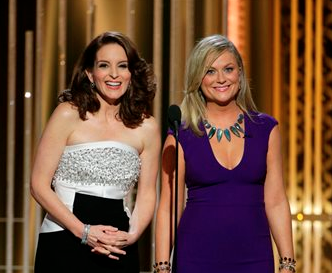Richard Linklater’s 12-years-in-the-making “Boyhood” was right on time at the Golden Globes, winning the night’s top honor, best drama, as well as best director for Linklater and best supporting actress for Patricia Arquette.
The sweetly humanist film had a similarly touching effect on one of Hollywood’s glitziest evenings. Taking out her written speech, Arquette apologized: “I’m the only nerd with a piece of paper.”
“Bottom line is we’re all flawed in this world. No one’s perfect,” said Linklater. “I want to dedicate this to parents that are evolving everywhere and families that are just passing through this world and doing their best.”
The night seemed to be setting up for the top two Oscar contenders — “Boyhood” and Alejandro Gonzalez Inarritu’s “Birdman” — to lead the Globes’ twin categories of drama and comedy. But in a major surprise, Wes Anderson’s “Grand Budapest Hotel” swooped in to win best picture, comedy or musical. He listed a mock thank you to the members of the Hollywood Foreign Press, the collection of mostly freelance foreign journalists who put on the Globes, naming “Yorum and Dagmar and Yukiko and Mounawar.”
“Birdman” nevertheless won best actor in a comedy or musical for its lead, Michael Keaton, who plays a former superhero star mounting a serious play on Broadway, and best screenplay.
Reflecting on his life, Keaton’s voice broke up as he thanked his son, whom he called his best friend. “Shoot,” he said. “Two things I swore I wasn’t going to do: cry and give air quotes.”
Kicking off the show, hosts Tina Fey and Amy Poehler wasted no time in skewering Hollywood’s most tender subjects: the hacking of Sony Pictures over “The Interview,” the sexual assault allegations against Bill Cosby and television’s rise as a cultural rival to movies.
In an opening blistering with zingers, the duo welcomed Hollywood’s “despicable, spoiled, minimally talented brats” to the Globes to celebrate “all the movies that North Korea was OK with.” They several times visited with a North Korea government character, played by Margaret Cho, who voiced her displeasure with all aspects of the show.
“Je Suis Charlie” reverberated through the ceremony, from signs held aloft on the red carpet by the likes of Helen Mirren to the speeches of Cecil B. DeMille winner George Clooney, who evoked the name of the satirical newspaper Charlie Hebdo that was recently attacked by deadly terrorists. HFPA President Theo Kingma drew a standing ovation for pledging support to free speech “from North Korea to Paris.”
Clooney, a young lifetime achievement honoree at 53, had been among Hollywood’s most vocal about preserving free speech after hackers threatened violence over “The Interview.”
“It’s a good chance for us to meet face to face and apologize for all those snarky things we said to each other,” said Clooney, referring to the embarrassing emails leaked by the hackers. He also spoke sincerely about his new wife, Amal Clooney: “It’s a humbling thing when you find somebody to love.”
In one of the evening’s most hotly contested categories, best actor in a drama, Eddie Redmayne emerged victorious over Benedict Cumberbatch (“The Imitation Game”), Steve Carell (“Foxcatcher”), David Oyelowo (“Selma”) and Jake Gyllenhaal (“Nightcrawler”) for his performance as Stephen Hawking in “The Theory of Everything.”
Julianne Moore won best actress in a drama for her startling performance as an academic with early on-set Alzheimer’s in “Still Alice.”
Amy Adams surprised in taking best actress in a comedy or musical for her performance in “Big Eyes.” ”I didn’t even reapply lip gloss,” said an unprepared Adams.
The first award of the night went to J.K. Simmons for best supporting actor for his performance as a domineering jazz teacher in the acclaimed indie “Whiplash.” He thanked his confident co-star, Miles Teller, whom he called: “A young actor of such maturity and brilliance that he inspired me every day to want to scream at him and hit him in the face.”
The night had an orchestrated but carefree spirit, filled with the usual high dose of glamour (Moore especially turned heads the red carpet), celebrity cameos (Prince!) and even the drink-swilling return of an old Globes villain, the former host Ricky Gervais.
The DreamWorks sequel “How to Train Your Dragon 2” took best animated film over the favorite, “The Lego Movie.” The Russian entry “Leviathan” took best foreign language film.
As the only major awards show to honor both movies and TV, the Globes have also benefited from television’s rise. Fey and Poehler alluded to that by leading the crowd in a call-and-response cheer, chanting “Movies … Awesome! TV … Better!”
Amazon, crashing the party like Netflix did before it, celebrated its first — and second — Golden Globe for the sexual identity comedy “Transparent,” winning best TV series, musical or comedy. The show’s star, Jeffery Tambor, landed best actor in the category, dedicating his award to the transgender community.
AMC’s adaptation of the Coen brothers’ acclaimed 1996 film, “Fargo,” came in the leading TV contender with five nominations and promptly won best miniseries or movie, as well as best actor, miniseries or movie, for Billy Bob Thornton.
“You can say anything in the world and get in trouble. I know this for a fact,” said Thornton. “So I’m just going to say thank you.”
Led by Fey and Poehler, the Globes have been on a terrific upswing in recent years. Last year’s awards drew 20.9 million viewers, the most since 2004. Accepting the Globe for best original song for “Glory” in the civil rights drama “Selma,” the rapper Common raised the status of the group behind the Globes even higher: “I want to thank God and the Hollywood Foreign Press.”

